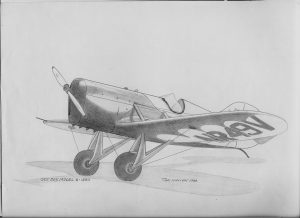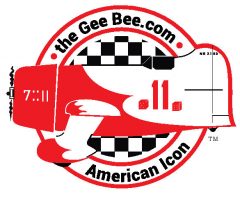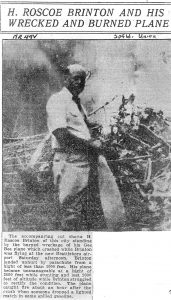“He struggled with one hand behind his back to free the parachute. It finally opened at 500 feet.”
J.I. Granville Farmers Take Flight
Springfield Union News Article Click to enlarge

The End of the Gee Bee X
On or about September 12, 1931 Roscoe Brinton, a friend of Lowell Bayles and fellow flyer at the Springfield (MA) Airport, took Bayles’ Gee Bee Model X to the new Brattleboro, VT airport to participate in the dedication festivities.
The Model X’s Cirrus engine had recently been replaced with a six cylinder Fairchild motor which proved to be hard starting in cold weather. As a precaution, a hand crank booster had been placed loose on the cockpit floor of the X. According to a Vermont newspaper covering the airport opening, the booster cables had become entangled in the Gee Bee’s joystick as Brinton performed his aerobatic routine and the little airplane flipped on its back unexpectedly. Normally not a problem, but Brinton hadn’t planned on flying the X inverted, so he hadn’t turned on the gasoline jet required for inverted flight. Others speculated that Brinton had simply forgotten to flip the switch before his performance. In any case, the engine stalled, sending the Gee Bee X into an inverted spin.
In her book Farmers Take Flight, June Granville recounts that Brinton bailed out of the Model X at 1,000 feet altitude, but his chute failed to open. After struggling to free the parachute, Brinton finally got it to open at 5oo feet and he landed unhurt on a farm two miles from the airfield. Upon returning to the airport, he went to the microphone and joked to the crowd: “If you were at the National Air Races, you would have had to pay a big price to see a stunt like that.”
A reporter’s errant match sparked a fire at the crash site and the Gee Bee X burned to a shell. It’s said that the Brinton family still has a propeller blade from the hulk, but nothing else remains.
Aviation enthusiasts in the Brattleboro area periodically search the site of the old airport for clues to other remnants of the Model X, but the trail is clouded by the near century-long span of time since that final flight.
By all accounts, the Gee Bee X was a fine flying airplane that fell victim to fate – and perhaps a bit of the carefree exuberance of aviation’s golden age.
References:
Farmers Take Flight, J. I. Dakin, 2000
Gee Bee – The REAL Story of the Granville Brothers and Their Marvelous Airplanes, Henry A. Haffke, 1989
The Golden Age of Air Racing, S. H. Schmid and Truman C. Weaver, 1991

